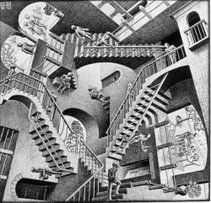
I still don't understand why some people wants to know which language is "best". I think the question is poorly stated, in any case. But if that is really the question, I don't get it. Maybe I am stubborn and I don't want to get it.
This parable by Alex Gross, first published in Language Montly in 1987, is about this topic.
The language contest
Fifty contestants enter a large hall. Inside the hall are fifty desks. Each contestant sits down at one of the desks. On each desk is a large weirdly shaped package. All the packages on all the desks have the same size and shape. They all jut out and scoop inwards in strange ways, and they all have a large number of surfaces at odd angles to each other. Some of the surfaces are very hard to the touch, some very soft.Found here.
All the packages are exactly the same in this regard. They are in fact identical in every way.
Next to each package is a small pile of wrapping paper, tape, perhaps some string. None of the piles of wrapping materials is the same. In some the wrapping paper comes in one or more sheets of different sizes, in others it comes in rolls or strips, in yet others it is nothing more than fragments or badly wrinkled shreds. The tape too comes in a weird variety of shapes, sizes, and quantities.
The string, on those desks that have it, may be anything from a half-full spool of thread to a thickly encrusted length of clothes line. A pair of scissors is also provided. In fact, the only uniform property possessed by these various piles, other than the scissors, is the known fact, announced to the contestants beforehand, that no one of the piles of materials is sufficient to wrap the package completely, regardless of the ingenuity of the contestants. The best any of them will be able to achieve is to wrap about 90% of the package, with about 10% remaining uncovered.
This, the principle rule of the contest, is now formally announced to the fifty participants. They must use all their knowledge and skills to wrap the package as completely as possible, using only the pile of materials on the desk next to the package. They will be judged according to their success in this task.
A few informal rules are also believed to be true by some contestants but not by others. One such rule alleges that it is possible to cheat by not following all the contours of the package and letting the wrapping material stretch from edge to edge over a hollow between surfaces. Others have heard this rule but believe they may be penalized if they do not cover all the surfaces. Others say that the whole game is an enormous put-on, but one must play along in order to be promoted. Some have also heard that one is awarded higher points for the dextrous use of the scissors, others believe one will be penalized for using the scissors too often.
Contestants employ various strategies in wrapping their packages. Some try to cover as large a surface as possible, leaving the unwrapped area as the very last portion of the package, when their materials run out. Some try to hide this space in some less easily visible contour of the package. Others, in their eagerness to cover space, do not care where this space ends up. A few, dependent on their supplies or their use of the scissors, try out a postage stamp technique, taping small pieces of paper on all surfaces of the box, with the unfilled space intervening on all sides.
The package is reality, with all its odd contours and escarpments. The piles of wrapping paper, tape and string are our languages (most certainly including our computer languages as well) with all their odd, arbitrary rules and connective structures. The places where the contestants fail to follow the package's contours are the places where our language (anyone's language) lies to us about reality. The scissors are probably akin to various odd ideas of grammar and usage that we keep on teaching and tending to believe. The places which cannot be covered by the tape or paper are those parts of reality none can escape: birth, death, hunger, animal passion in its positive and negative aspects.
It is finally announced that none of the wrapping procedures is necessarily better than the others. This message is received amidst much booing, as many contestants are quite convinced that their method of wrapping is clearly the best.
Still others complain that hundreds of other possible contestants were not invited to take part, while some voice the claim that the contest is too simple-minded because everyone receives the same reality/package, contrary to "true" reality, which may differ from people to people, culture to culture, coordinately with language.
The judges give up and leave. No prizes are awarded.
I think I am getting tired of the absurd question "What is the best language?".











No comments:
Post a Comment